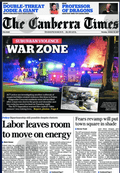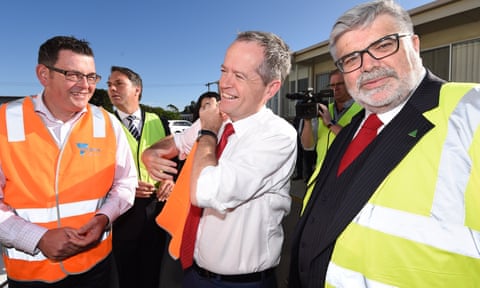Good morning, this is Eleanor Ainge Roy bringing you the main stories and must-reads on Thursday 19 October.
Top stories
Labor’s Kim Carr breaks it gently to the Coalition party room that they have just given the green light to what is effectively an emissions intensity scheme, even if they are calling it a national energy guarantee (Neg). In a speech to be given to the Food and Grocery Council today, seen by Guardian Australia, Carr warns the Neg does not do enough to reduce prices in the short term but signals possible cooperation if the government provides details of how the scheme will work. The Neg, announced and adopted by the Coalition on Tuesday, imposes new reliability and emissions reduction guarantees on energy retailers and large energy users. Carr will say: “What’s particularly interesting, and I am not certain that the government party room has understood this, [is] the new measures have remarkable underlying similarities to the principles of the electricity intensity scheme that were rejected last December.”
The Greens aren’t having a bar of that, though, and have accused the Coalition of doing a Donald Trump and effectively walking away from Australia’s Paris agreement commitments. Adam Bandt says that comparing the Finkel review renewables forecasts to those predicted under the Neg shows the sector will be worse off. “This scheme is worse than doing nothing,” Bandt says. “At a time when we need more wind and solar to cut pollution, the national energy guarantee will likely mean less renewable energy. It takes a particular malevolence to not just cut support to renewables but to actively pull them out of the system.”
The Game of Thrones actor Lena Headey has added her voice to the growing number of women who have accused Harvey Weinstein of sexual misconduct. In a series of posts on Twitter, Headey said that Weinstein had spoken to her inappropriately at the Venice film festival and reacted with anger when she resisted his advances in a Los Angeles hotel, leaving her feeling “powerless”. “We walked to the lift and the energy shifted, my whole body went into high alert, the lift was going up and I said to Harvey, ‘I’m not interested in anything other than work, please don’t think I got in here with you for any other reason, nothing is going to happen,’” she wrote. As Headey was leaving the hotel, Weinstein allegedly whispered: “Don’t tell anybody about this. Not your manager, not your agent.” “I got into my car and I cried,” the actor added. Headey’s account comes after more than 40 other women have accused Weinstein of sexual assault and harassment, allegations he denies.
The Productivity Commission has basically told the government it’s dreaming when it comes to targets for the national disability insurance scheme. The commission releases its report on the costs of the $22bn NDIS today, and offers a bleak assessment of the chances of meeting the tight deadlines set out in a series of bilateral agreements between the commonwealth, states and territories. The federal government will not meet its target of 475,000 national disability insurance scheme participants by 2019-20, and is failing to grow the disability workforce fast enough to meet the looming demand. And the fears of advocates are confirmed by the report, which says the “[National Disability Insurance Agency’s] focus on participant intake has compromised the quality of plans and participant outcomes”.
The abundance of flying insects has plunged by three-quarters over the past 25 years, prompting scientists to warn that the world is “on course for ecological Armageddon”. The cause of the huge decline is as yet unclear, although the destruction of wild areas and widespread use of pesticides are the most likely factors, and climate change may play a role. “Insects make up about two-thirds of all life on Earth [but] there has been some kind of horrific decline,” said Prof Dave Goulson of Sussex University in the UK, and part of the team behind the new study. “We appear to be making vast tracts of land inhospitable to most forms of life ... if we lose the insects then everything is going to collapse.”
Sniffer dogs at Australian music festivals could be costing hundreds of thousands of dollars a year and yielding very few arrests in exchange, according to the Greens. Fewer than 2% of people searched after being detected by dogs at festivals are charged with drug-dealing offences, they say. The New South Wales Greens’ estimates put the cost of three drug dogs at a music festival at $6,000 an hour, or $36,000 for six hours. If drug dog operations were run at 20 festivals a year, the cost would reach $720,828. The Greens MP David Shoebridge, who has long been opposed to the use of sniffer dogs at festivals, firmly suggests this is a waste of money.
The Canadian province of Quebec has passed a law banning facial coverings in public. The sweeping legislation bars public workers from wearing the niqab or burqa, and obliges citizens to unveil when riding public transit or receiving government services – ushering in a law believed to be the first of its kind in North America. The ban has been slammed by critics who say it deliberately targets Muslim women and will fuel the province’s simmering debate on identity, religion and tolerance. “We can’t divorce this bill from the larger context in which it falls,” said Ihsaan Gardee of the National Council of Canadian Muslims. According to Statistics Canada, hate crimes targeting Canadian Muslims increased from 2012 to 2015 by 253%.
Sport
While the rise of women’s cricket can hardly be classed as an overnight success, significant changes have been seen of late and, with the women’s Ashes series on the horizon, the upward trajectory is unlikely to stop here, writes former Australian international Mel Jones.
Thinking time

Which Netflix shows are being binged the fastest – and why? The Guardian’s Stuart Heritage delves into the latest stats and discovers an an obsession with nostalgia, and a lack of interest in critical acclaim. “The term ‘Binge-racers’ applies to people who smash through an entire series within 24 hours of it appearing on the service,” writes Heritage. Shorter shows are most easily bingeable, he finds; light comedic dramas take out 14 of the top 20 spots and critically lauded shows are just not popular. Taking out the No 1 most-binged show on Netlfix? Gilmore Girls: A Year in the Life.
After being elected to the NSW upper house as the first female Muslim MP in an Australian parliament, public attention focused on how Mehreen Faruqi would reconcile her faith with the Greens’ support for LGBTQI rights – a question rarely asked of an MP of any other faith. But she says, “Who can better understand the trials and tribulations of being a minority community than a brown, migrant, Muslim woman? We know what it feels like to face prejudice.”
This week the American writer George Saunders, celebrated for his short stories, won the Man Booker prize with his first novel, Lincoln in the Bardo. He talks to the Guardian’s Paula Cocozza about brevity, empathy and how he sees writing as a form of activism. “I always think to myself that political thoughts, or aesthetic thoughts, are like little deer. They’re very delicate and don’t want you looking at them directly. For me, it’s just about the sentences and the form. Concentrate, concentrate, concentrate. Be truthful. Be lively. And those things will just come right in.”
What’s he done now?
Donald Trump is denying he said an American soldier who died in Niger “knew what he signed up for” – words allegedly overheard by his grieving widow. Speaking to reporters in the White House, Trump said: “I didn’t say what that congresswoman said. Didn’t say it at all – she knows it. I had a very nice conversation with the woman, the wife, who sounded like a lovely woman.”
Earlier he had also tweeted a denial.
Democrat Congresswoman totally fabricated what I said to the wife of a soldier who died in action (and I have proof). Sad!
— Donald J. Trump (@realDonaldTrump) October 18, 2017
Media roundup

The Canberra Times splashes with an arresting image of a chaotic street and the headline “Suburban violence warzone”. The story says ACT police are investigating an outbreak of bikie-related violence, with Kalgoorlie Crescent residents left terrified after a man was shot and two vehicles set alight this week.
NT News says red tape has delayed the development of a $200m luxury hotel on Darwin’s waterfront, with the Chinese investors bogged down in discussions regarding land access. The project will not go ahead this year.
The New York Times has a long read and photo essay on the liberation of the Isis stronghold of Raqqa in Syria, and says that with the loss of its caliphate the group may be forced to return to its guerrilla roots.
Coming up
Parliament will sit, with the government continuing to sell its new energy policy, which imposes reliability and emissions reduction obligations on electricity retailers. The prime minister will start the day with a breakfast business briefing about the new policy with members of the Ai Group.
The legal stoush between Australian tennis player Thanasi Kokkinakis and breakfast cereal giant Kellogg’s over the rights to use his nickname “Special K” commercially returns to the federal court.
Supporting the Guardian
We’d like to acknowledge our generous supporters who enable us to keep reporting on the critical stories. If you value what we do and would like to help, please make a contribution or become a supporter today. Thank you.
Sign up
If you would like to receive the Guardian Australia morning mail to your email inbox every weekday, sign up here.
